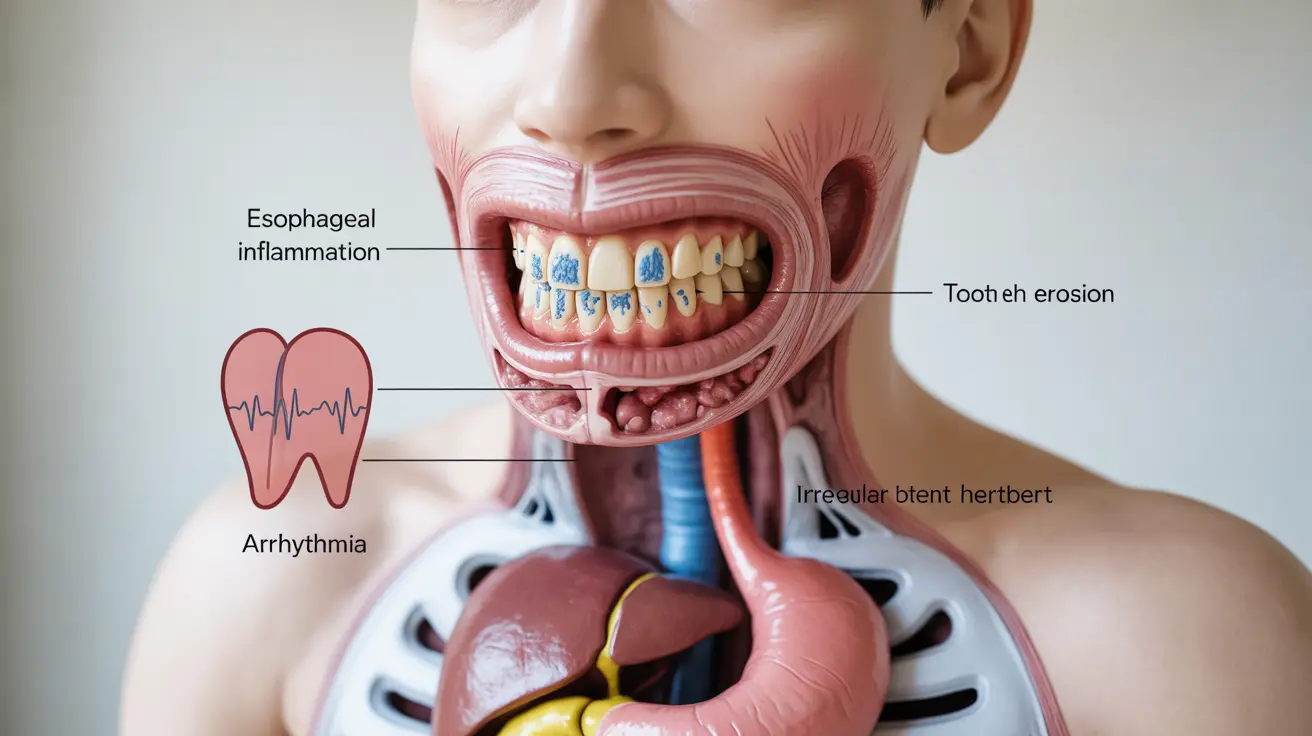Bulimia nervosa is a serious eating disorder that can have devastating effects on both physical and mental health. Understanding the side effects of bulimia is crucial for recognizing the condition's severity and the importance of seeking treatment early. This comprehensive guide explores how bulimia impacts various body systems and overall wellbeing.
Physical Impact on the Body
Bulimia's cycle of binging and purging can cause significant damage to multiple organ systems. The body experiences severe stress from these behaviors, leading to both immediate and long-term health complications.
Digestive System Effects
The digestive system often bears the initial brunt of bulimic behaviors. Regular purging can cause:
- Esophageal inflammation and tears
- Chronic stomach pain and bloating
- Delayed gastric emptying
- Irregular bowel movements
- Severe acid reflux
Dental and Oral Health Complications
Frequent exposure to stomach acid through purging creates severe dental problems:
- Severe tooth enamel erosion
- Increased cavity formation
- Sensitive and brittle teeth
- Swollen salivary glands
- Chronic dry mouth and sore throat
Cardiovascular and Metabolic Effects
The strain of bulimia on the body's systems can lead to serious heart and metabolic issues:
Heart Health Impacts
Regular purging behaviors can cause:
- Irregular heartbeat
- Low blood pressure
- Electrolyte imbalances
- Increased risk of heart failure
- Poor circulation
Metabolic Disruptions
The body's natural metabolic processes become disrupted, leading to:
- Severe dehydration
- Hormonal imbalances
- Blood sugar fluctuations
- Muscle weakness
- Chronic fatigue
Mental Health and Emotional Impact
Bulimia's effects extend far beyond physical symptoms, causing significant psychological distress:
Psychological Symptoms
Common mental health effects include:
- Severe anxiety and depression
- Mood swings
- Poor self-esteem
- Social isolation
- Difficulty concentrating
Long-term Health Risks
Without proper treatment, bulimia can lead to severe long-term health complications:
- Chronic kidney problems
- Permanent digestive issues
- Increased risk of certain cancers
- Bone density loss
- Fertility problems
Treatment and Recovery
Recovery from bulimia requires comprehensive treatment addressing both physical and psychological aspects. This typically includes:
- Medical supervision for physical symptoms
- Nutritional counseling
- Individual psychotherapy
- Group support
- Family therapy when appropriate
Frequently Asked Questions
What are the common physical side effects of bulimia on the body? The most common physical side effects include dental erosion, digestive problems, electrolyte imbalances, irregular heartbeat, dehydration, and hormonal disruptions.
How does bulimia affect dental health and what are the long-term risks? Bulimia severely impacts dental health through frequent exposure to stomach acid, leading to tooth enamel erosion, increased cavities, tooth sensitivity, and potential tooth loss.
What mental health symptoms are associated with bulimia nervosa? Common mental health symptoms include anxiety, depression, mood swings, low self-esteem, social isolation, and obsessive thoughts about food and body image.
Can bulimia cause serious heart or kidney problems? Yes, bulimia can cause serious heart problems including irregular heartbeat and heart failure. It can also lead to kidney damage due to severe electrolyte imbalances and dehydration.
What are the risks of untreated bulimia and how can it be managed? Untreated bulimia can lead to severe organ damage, chronic health issues, and life-threatening complications. Management requires comprehensive medical care, psychological support, and ongoing monitoring of physical and mental health.




